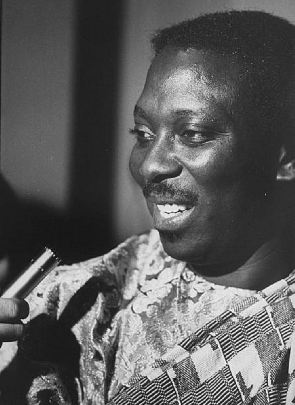Throughout Ghana’s political history, statesmen and women have long played significant roles on the domestic and international front.
Although history books may not often rekindle their deeds, these men and women, by their giant strides made impactful contributions to the country and shaped Ghana’s history
Key among such distinguished persons is Dr. Alexander Quaison-Sackey who was a Ghanaian diplomat that served during the first and third republics.
Quaison-Sackey who was significant in the creation of the now Ministry of Foreign Affairs and Regional Integration went on to also become the first black African to serve as president of the United Nations General Assembly.
Alex Quaison-Sackey was born on August 9, 1924 at Winneba in the Central Region. His family were active in Ghanaian politics which some believed led to his drive to become a key figure in Ghana’s political history.
Alex Quaison-Sackey had his education at the Mfantsipim Senior High School where he was politically active. He later attended the Achimota College for his undergraduate education until 1948.
According ghanaianmuseum.com, Dr. Alex Quaison-Sackey went on to earn a degree at Oxford University-UK in 1952 and became a diplomatic troubleshooter for Kwame Nkrumah, Ghana’s first president after it gained independence in 1957 from the British colonial rule.
Within a short period, Quaison-Sackey earned himself a number of successful feats which included; The first secretary at the Ghana High Commission from 1957 to 1959. He also served as the country’s representative at the United Nations from 1959 to 1965 and was also Ghana’s ambassador to Cuba from 1961 to 1965 and ambassador to Mexico from 1962 to 1964.
From 1964 to 1965, Dr. Alex Quaison-Sackey served as president of the United Nations General Assembly, becoming the first diplomat from a black African nation to hold that position.
In 1965, he became the foreign minister of Ghana, serving in that position for only a few months, as he was later dismissed shortly after President Kwame Nkrumah was overthrown in February 1966.
It is said that Dr. Alex Quaison-Sackey remained close to President Kwame Nkrumah and was with him on a peace mission in Vietnam in February 1966, following the overthrow of the Nkrumah administration.
With a new military regime in force, Quaison-Sackey was said to have gone into self-imposed exile where he later died at the Korle Bu Teaching Hospital on December 28, 1992 after battling pulmonary embolism.
The 68-year-old stateman was survived by his wife, Elsie, and their five children.
Watch a video of Alex Quaison-Sackey delivering a speech at the United Nations General Assembly
MA/KPE
General News of Saturday, 11 March 2023
Source: www.ghanaweb.com

















